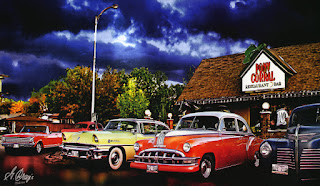The 1970s were the days when the national news programs of CTV and CBC were at 11 PM. Networks liked to put in programming in the 10 PM slot in central time or later that might not fit in the prime time schedule. No one had 24 hour TV back then including the stations down in North Dakota. The CBC would often squeeze in shows like Fawlty Towers and Sandbaggers at end of day schedule. I know I missed both when they aired on CBC but by early 1980s Fawlty Towers was endless played on PBS. It would take years before I'd catch The Sandbaggers to watch in it's entirety. Prairie Public Television carried a lot of British TV but they were often comedies and dramas. That remains true today.
Tubi has got the Sandbaggers on now which is rather amazing since it will bring a whole new audience to the show. Some find their way to show by following the work some of the actors did through the 1970s and 1980s. This is very much the case for Roy Marsden who gained fans on both sides of the Atlantic for the P.D. James series Dalgliesh. Many loved his cool performance as a detective. And if they liked that, they searched out and loved his acting in Sandbagger as director of operations for SIS.
The writing of Ian Mackintosh was exceptional and nuanced. His background as a naval officer had served him well as a writer on the BBC series Warship. However, it was rumoured he had experience with the Security Intelligence Service as well. This contributed to the sense of realism. Any variance from the actual SIS was probably to avoid running into the Official Secrets Act. In fact one episode was torpedoed because of the act.
The series was filmed in Leeds and some location work in London and Malta. The large population of Leeds made it possible to film many locations as eastern European. Casting was also done in such a matter that scenes felt authentic. The budget for The Sandbaggers was not huge. The studio work was shot on videotape and location on cheaper 16 mm film. A lot of stock footage was used to great effect. It is striking that filming took place inside McDonald's or featured Hilton Hotels. Such things seem less likely nowadays. It seems to provide a time capsule of what Britain was like in the late 1970s/80s.
In 1978, the time of Britain's Winter of Discontent weighed heavy. Massive strikes were happening all over and the Labour government of James Callaghan struggled to keep the country going. Strikes even shut down Sandbaggers producer Yorkshire Television. Even the BBC was shut down by the end of the year. Shows about corrupt and violent police were more likely to be seen in the UK over an urbane and realistic spy series. James Bond series and The Saint were more likely to be seen than The Spy that Came Out of the Cold- type of series.
The Sandbaggers name was used for the Special Operations Section of the SIS consisting of three operatives who take on the most dangerous or politically sensitive assignments around the world. The term came from how thugs would fill socks with sand to beat someone for their goods. Neil Burnside was D-Ops and responsible for sending Sandbaggers 1 through 3 out on jobs. As former Sandbagger 1, Burnside knew what it took. Burnside reports to the Deputy Chief and Chief of SIS (known as C) and is often in conversation with the Permanent Undersecretary of the Foreign Office Sir Geoffrey Wellingham, his former father-in-law.
For non British watching, they often miss the class visuals. Ties that indicate Oxford colleges or military background abound. Top administrators are often knights with the title Sir added to their name. The Deputy Chief Peele seems to aspire to that type of recognition.
The Sandbaggers themselves such as Willie Caine and Laura Dickens seems to come from more common folk. Caine has a military background but not particularly fond of guns. Dickens wants to serve her country as an intelligence analyst but in her introduction shows her deliberately overturning a car to make a contact with the son of a foreign leader. Her relationship with Burnside ends tragically when under his orders she is shot in a prisoner exchange to prevent the French from interfering with the special relationship with the U.S. government.
It is the sad and singular life that Burnside lives. A dedicated intelligence service man, divorced and with no outside interests. His best friends are the CIA station Jeff Ross chief and his Sandbagger 1 Willie Caine. He resists pretty much any attempt to set him up with a date. And the one person he does form affection for he has to order to be shot. It is likely we have never seen this type of storyline before on TV and may never see again.
Some have called Sandbaggers the best spy show there ever has been. Since I enjoy many spy TV/movies like James Bond and Tinker Tailor, I wouldn't want to limit myself. I can say that many probably enjoy the show so much is because the characters are very well developed. The friendship between the intelligence officers, especially SIS and CIA, seems sincere and authentic.
The show ended suddenly with the death of the producer/writer Ian Mackintosh in a small plane crash in Alaska. The network didn't believe anyone else could write the show like he could. A lot of mystery surrounded the death of the show and some even wondered if it was related to espionage.
Sadly, unlike other shows that the British have done, the Sandbaggers has never been set for a sequel, remake or anything of the like. This is a mystery since so many American shows or productions from other countries seem to be re-made. If Matlock can come back, why not Sandbaggers?
Watch while you can on Tubi.

.png)















